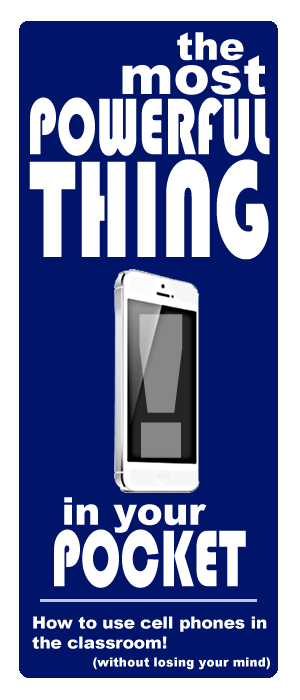Anybody out there have the classroom rule: No cell phones allowed? Or maybe your school set up that rule? My school has that rule too, and so does my classroom…
Kind of.
 See, I’ve been rethinking that rule lately. Especially for a classroom that has 1:1 computers and is trying to do lots more (or maybe all) in the digital space. I understand why the rule exists. Kids will be kids. They will text, Instagram, askFM, Snapchat, Doodle Jump, and anything else during my precious teaching time. So no phones. At. All.
See, I’ve been rethinking that rule lately. Especially for a classroom that has 1:1 computers and is trying to do lots more (or maybe all) in the digital space. I understand why the rule exists. Kids will be kids. They will text, Instagram, askFM, Snapchat, Doodle Jump, and anything else during my precious teaching time. So no phones. At. All.Wouldn’t they be blown away that we have such powerful tools but usually use them to look up cat videos and play Candy Crush?
1. Let them research.
Except when we do that, haven’t we taken away perhaps the most valuable tool in the history of mankind? I mean, what would previous generations have given to carry such a powerful tool around in their pockets?! Einstein? Newton? Caesar? All that research? All that information? Right there at their fingertips.
Wouldn’t they be blown away that we have such powerful tools but usually use them to look up cat videos and play Candy Crush?
2. Let them explore vocabulary.
Wouldn’t they be blown away that we have such powerful tools but usually use them to look up cat videos and play Candy Crush?
2. Let them explore vocabulary.
So a kid is reading her book and gets to a word she doesn’t know. Most students skip those words because it takes too long to walk to the dictionary and look it up. Well, why not let her look the word up by using her phone and the dictionary.com app? This encourages curiosity and real-time learning, which are two huge qualities of lifelong learners.
3. Let them finish other classwork.
3. Let them finish other classwork.
 Another student is done early with his classwork. He wants to keep working, but the only work he has left is from another class and requires him to go online. Why not let him use his Edmodo app to access his PDFs, PowerPoints, blogs, and Google activities from his other teachers? Then right there in your class from any device he has, he can work on his GIVER homework from his literature class, completing his digital interactive activities right there at his desk without disrupting the flow of the other learners who are still finishing up.
Another student is done early with his classwork. He wants to keep working, but the only work he has left is from another class and requires him to go online. Why not let him use his Edmodo app to access his PDFs, PowerPoints, blogs, and Google activities from his other teachers? Then right there in your class from any device he has, he can work on his GIVER homework from his literature class, completing his digital interactive activities right there at his desk without disrupting the flow of the other learners who are still finishing up.4. Let them move at their own pace.
A student is done handwriting her first draft of an essay, while the other students are still writing. It seems a little silly for her not to be able to start typing her essay out in the notepad on her phone so she can email it to herself later. Or typing it in Google Docs for easy access on her computer that evening at home.
How about those students in creative writing class who need to do in-the-moment research for all kinds of random stuff in their story or movie screenplay or novel chapter? Again, easy.
5. Let them use less paper.
A student wants to take notes in their Google Drive folder instead of on paper. Why not? I do this in my real life. It helps me organize my clutter into a digital storage space that I can take and access anywhere. If I need to find my notes later, a simple search and I’ve found it. It also allows them to take notes without having to worry about desk space because their phones are waaaay smaller than their classroom computers. And this digital notetaking tool is so accessible to them, especially if your classroom isn’t ready on a particular day for them all to get out their Chromebooks to take notes.
A student wants to take notes in their Google Drive folder instead of on paper. Why not? I do this in my real life. It helps me organize my clutter into a digital storage space that I can take and access anywhere. If I need to find my notes later, a simple search and I’ve found it. It also allows them to take notes without having to worry about desk space because their phones are waaaay smaller than their classroom computers. And this digital notetaking tool is so accessible to them, especially if your classroom isn’t ready on a particular day for them all to get out their Chromebooks to take notes.
And let’s keep remembering … using less paper allows us to do small things to care for the environment and our world.
6. Trust and empower your learners.
6. Trust and empower your learners.
I know it’s hard to trust them. They work so hard to lose our trust. They might starts using Wolfram Alpha to solve their math problems. They might just steal vocabulary sentences from other websites instead of creating them themselves.
But I, for one, have always thought it’s a little backwards for us to make our rules the cheaters instead of empowering the winners. What if we just call all of them to a high standard, give them the tools, then figure the rest out.
That’s where I’m headed.
What are your thoughts? I’d love to hear your ideas on this journey.










